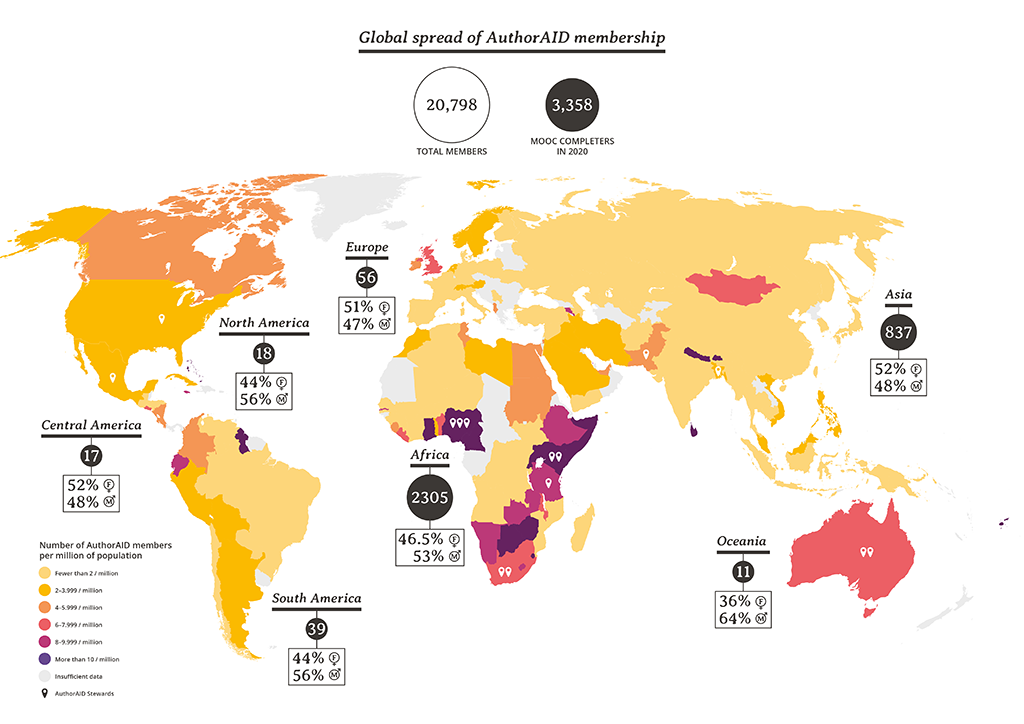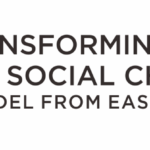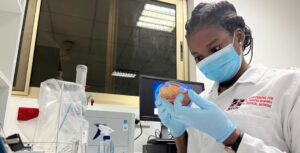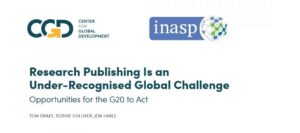
Developing AuthorAID towards a community-led model
Andy Nobes reflects on the evolution of AuthorAID over the past two years and the importance of growing community leadership.
As we reach the end of 2021, it feels like a good time to reflect on how INASP’s AuthorAID project has evolved over the last two years. Much like 2020, this year has been an unusual and challenging period in which the project has needed to adapt further to respond to the needs of members, and to ensure that AuthorAID members are able to receive the support they need from us and other members of the community.
Since its launch nearly 15 years ago, AuthorAID has been working to address inequities experienced by researchers in the Global South, through training and mentoring in research writing and proposal writing. The pandemic has changed many things for the researchers whom we support, and so the AuthorAID platform has needed to grow further to respond to this.
The online aspects of AuthorAID have become increasingly important and funding from Sida as part of INASP’s Global Platforms for Equitable Knowledge Ecosystems (GPEKE) programme over the past couple of years has enabled us to enhance the AuthorAID website, our Moodle online course platform, and discussion groups, so they continue to increase the capacity of researchers. However, we had not anticipated quite how crucial online delivery would become over the couple of years.
Over the course of 2021, we have increased our membership to more than 26,000 researchers and run three Massive Open Online Courses (MOOCs) on research writing and proposal writing. Together, these supported more than 7,500 researchers from 74 countries.
Below we outline three key areas of AuthorAID that have evolved in response to challenges that our community have faced.
Establishing new ways of working
In early 2020, when the COVID-19 pandemic began to affect lives and ways of working worldwide, we initially assumed that our online courses would be sparsely attended due to participants having more urgent priorities. We also feared that a more closed world would lead to a deepening of the digital divide and prevent researchers from accessing our platforms. We did see some early problems with researchers struggling with access to online learning (for example losing access to institutional internet connections) and with balancing work and home life pressures. However, many others in our community found themselves able to take the opportunity to learn new (and build existing) skills. We were surprised by how many people signed up to AuthorAID online courses – we saw a jump from 4,091 participants in 2019 to 7,220 in 2020, and a further increase to 7,596 this year.
We were also interested to see changing expectations and challenges from learners. AuthorAID online courses are primarily designed for low bandwidth contexts; they emphasise quality asynchronous learning and provide minimal video to ensure that those with the poorest internet access are able to complete courses. However, as most institutions rapidly moved to online instruction over the course of last year, and people improved their webinar and online skills, there was an expectation for more video content and live synchronous training.
A more pressing need for online learners has been flexibility. Whilst the number of people registering for our MOOCs rose, the completion rates dropped slightly, to below 40% for the first time (pre-pandemic we saw completion rates of around 50%).
To try to understand this issue more, this year we sent short follow-up surveys to those who failed to complete a course. We found that over 70% reported that it was ‘time management and other work’ that was the main significant obstacle to completing courses; this was more than double the percentage that reported internet problems as their main obstacle. Challenges with ‘family commitments’ were also reported by 20% of participants.
Of course, flexible course deadlines are one way of addressing this issue, and some learners have benefitted from entirely ‘self-study’ courses which we have developed which no fixed deadlines. However, the completion rates for these courses has been low, and learners are not able to benefit from interaction with facilitators or co-learning with a larger group of researchers which are part of our MOOCs.
So, it is a fine balancing act supporting a global group of researchers – many benefit from low-bandwidth content, an increasing number expect more synchronous video content, and others need more flexible learning to fit into their busy work and home life.
Creating community champions
We have also seen an evolution in the nature of leadership and engagement from within the AuthorAID community. Our ‘steward’ model was launched in early 2020 as a first step in developing the AuthorAID platform to become a more community-led initiative.
The AuthorAID stewards are a globally diverse group of volunteer community members who advise the project on strategy, content and vision, and they were able to energise community engagement as the pandemic set in. Many researchers in the AuthorAID community were experiencing challenges doing their research, adapting their work and balancing their changing lifestyles at the onset of the pandemic. As a way of helping our researchers to engage with the community and share experiences, three of our stewards (Aurelia Munene, Dr. Zainab Yunusa-Kaltungo and Dr. Funmilayo Doherty) took charge of revitalising the AuthorAID WhatsApp-based journal clubs as a way of supporting disconnected researchers and taking advantage of a new hunger for online peer learning.
Another of the AuthorAID stewards, Joyce Wangari, encouraged members of her online journal club to begin documenting their experiences with COVID-19 and share accounts of their challenges. The results were – and continue to be – inspiring. Not only did community members document their COVID-19 experiences; they shared also interesting perspectives on a variety of research activities and how they had been adapted to meet a rapidly changing environment. Community members also zoned in on other insightful topics such as shifting family structures, adaptations in conducting remote interviews, and other reflections on the pandemic.
Through this initiative, we witnessed an increase in organic growth, and most importantly, we saw the emergence of community-led leadership. With an increase in personalised interactions and self-organisation, the WhatsApp journal clubs have continued to grow and change in response to the needs of the community. These activities are spearheaded by community members who organise and prioritise the needs of the group, resulting in more diverse content, community-driven activities and more sustainable and resilient ways of working. We want to continue learning from how our community innovates and will be sharing a learning resource in 2022 on how other researchers can start their own online journal clubs and groups.
Ultimately, we want to see AuthorAID content and online courses coordinated and led by researchers in the Global South. As a step towards this aim, AuthorAID members have been able to take advantage of a new INASP online resource this year – ‘Facilitating Events and Courses in and Online World’, which has been run as both a self-study course and a facilitated pilot course. This has allowed many members to build their skills in online facilitation and event coordination, and we hope to give these eager new facilitators further opportunities to contribute to activities in 2022.
Recalibrating for community collaboration
The increased community activity we have seen this year has highlighted the need to adapt some of the core functions of the AuthorAID website itself, to make community contributions easier.
In the past, we have put out calls for community members to write blog posts, but this has involved lots of back-and-forth via email between AuthorAID team members to edit, review and post contributions. In response to this issue, we launched a new publishing workflow to allow community members to submit blog posts directly to the platform, to be reviewed by volunteer reviewers. We have also appointed our first guest ‘Managing Editor’ who will hand over the baton on a quarterly basis – Professor Richard de Grijs is our first editor. This has already started making community engagement much easier to coordinate and has removed some of the barriers to community contribution.
We have also hosted several webinar events in 2021 – which have been delivered by members of the AuthorAID community. Moderated by members of the stewards team, they have provided members with the opportunity to contribute to key topics of interest to the wider community, for example Wellbeing In Academia, Plagiarism, Proposal Writing Basics, and How to choose the right journal.
Our system of incentivising community engagement has had to adapt too. As more community members take part and even lead in activities, we want to recognise and showcase their contributions; and also provide them with a clear pathway for progress so that they can gain further recognition within AuthorAID. Incentives will range from rewards such as badges in recognition of community engagement/contribution, to increased visibility and responsibility within the community. This might include, for example, opportunities to become a guest facilitator for MOOC courses or joining the group of stewards.
In a time of so much change and uncertainty, it has been encouraging to see the role that AuthorAID has been able to continue to play in providing continuity and support. And it has been inspiring to see the steps that the AuthorAID community has been making to adapt and grow the project.
There is much to learn from and build on as we look towards the final year of the GPEKE project and the next steps for AuthorAID, and as we look towards a time when hopefully the impact of COVID-19 will be less severe on researchers in low- and middle-income countries.
Cover infographic: SQUARE Beasts

 Previous Post
Previous Post Next Post
Next Post


